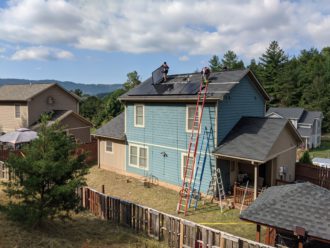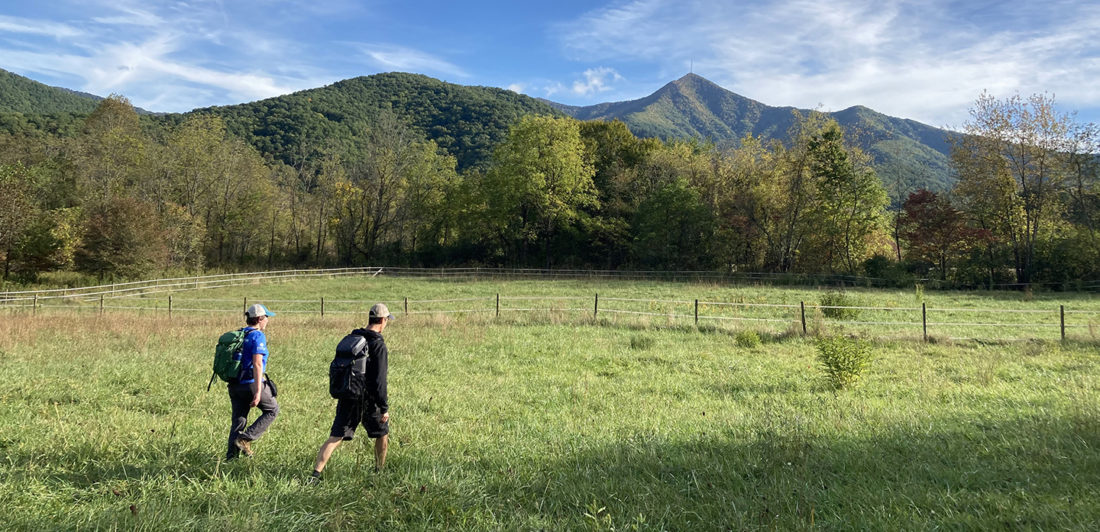After not passing a budget at all in 2019, the Republican-led N.C. General Assembly and Democratic Gov. Roy Cooper agreed last month on nearly $53 billion in state spending through fiscal year 2022-23. Sprinkled throughout the 628-page document are provisions totaling tens of millions of dollars for environmental and conservation projects in Western North Carolina.
Among the largest allocations are $12.2 million to accelerate the purchase and opening of Pisgah View State Park in Buncombe County, $7.2 million for the removal of hazardous dams across WNC and $5 million to upgrade the city of Hendersonville’s wastewater treatment plant. Other projects of local interest include $1 million for French Broad River restoration in Henderson County, $750,000 for a recreation master plan at the DuPont State Recreational Forest, $600,000 toward the restoration of WNC hemlocks infested by the woolly adelgid and $500,000 for the Muddy Sneakers outdoor science education program in Brevard.
Both of Buncombe County’s state senators supported the budget and drew attention to its local environmental benefits in press releases announcing their votes. “I am thrilled to have earned the role of chairman of an appropriations committee from where I could partner with Rep. [Tim] Moffitt [R-Henderson] and Rep. [Jake] Johnson [R-Henderson] to ensure our WNC voice was heard loud and clear,” wrote Republican Sen. Chuck Edwards. “This budget echoes our voices.”
“This budget is not what we wanted, but it will get a lot of good done, and we live to fight another day for the things left undone,” wrote Democratic Sen. Julie Mayfield. “Bipartisan support for any major issue is an accomplishment in our very divided government, and we can and should be proud of what this budget will do.”
WNC armadillo sightings multiply
The nine-banded armadillo, a roly-poly critter native to South and Central America, is becoming an increasingly common presence across WNC. The N.C. Wildlife Resources Commission has recorded more than 70 sightings since launching the NC Armadillo project in May 2019. (See “Armored invasion,” Xpress, Aug. 7, 2019, avl.mx/ayw.)
And in at least four WNC counties, armadillos are here to stay. According to NCWRC biologist Colleen Olfenbuttel, the commission has received confirmed reports of multiple armadillos together, indicating an established breeding population, in Cherokee, Macon, Jackson and Transylvania counties.
Warmer winters driven by climate change are a key factor in the armadillo’s northward expansion. Olfenbuttel notes that the species had previously been limited from overwintering in the area due to its poorly insulated shell and the difficulty of digging for food in frozen ground.
The ecological impact of the armadillo’s arrival is yet to be fully understood. But some local landowners, having experienced lawn and garden damage due to rooting armadillos, have resorted to hiring animal control specialists, as recently reported in British newspaper The Guardian (avl.mx/ayy).
The NCWRC encourages residents to report any armadillo sighting via iNaturalist.org or by email at Armadillo@NCWildlife.org. Reports should include a photo, location, and date and time of the sighting. More information is available at avl.mx/pru4.
Asheville expands composting pilot program
Since October, Buncombe County residents have been able to drop off compostable materials such as food scraps, plant trimmings and paper products at the Stephens-Lee Recreation Center and county landfill convenience center in Alexander. And they’ve been doing so with gusto.
According to a press release from the city of Asheville, at least 720 households — most of which had never previously composted — have participated in the drop-off program, together keeping more than 9,200 pounds of material out of the landfill. In response to the high demand, the city has added more roll carts at the composting sites and doubled the rate at which carts are emptied.
“As we monitor interest and success of this pilot program and evaluate participant data, residents are encouraged to look for expansion into neighborhood locations in spring 2022,” writes city spokesperson Polly McDaniel.
More information and a program registration form are available at avl.mx/akn. Residents who complete the form can receive a free countertop food-scrap collection bin while supplies last.
Opportunities knock
-

UP ON THE HOUSETOP: The Solarize Asheville-Buncombe project resulted in 180 new rooftop solar systems, together representing 1.45 megawatts of new generating capacity. Photo by Sophie Mullinax Solarize Asheville-Buncombe, a program led by the nonprofit Blue Horizons Project, wants help donating a free solar energy system to a local nonprofit. By reducing electricity costs, the system is meant to free up the recipient’s resources for core mission work. Nominations are open through Monday, Dec. 13; more information is available at avl.mx/ay1.
- The Friends of DuPont Forest, a nonprofit booster organization for the DuPont State Recreational Forest, is seeking members for its board of directors. New members will start in April and will help guide the organization’s planning, policy development, financial oversight and mission fulfillment. More information and application details are available at avl.mx/prvc.
- Applications are open through January for the Careers in Conservation Scholarship, a program of the N.C. Foundation for Soil and Water Conservation. Current and prospective students at North Carolina colleges majoring in agricultural or conservation fields are eligible for up to $1,000 per year of schooling. More information is available at avl.mx/axz.
Community kudos
- The Eastern Band of Cherokee Indians passed a resolution empowering Principal Chief Richard Sneed to “set reasonable targets” for reducing the tribe’s carbon emissions. Specific actions outlined in the resolution include the assessment of new construction projects for renewable energy potential and the installation of at least 20 electric vehicle charging stations across the Qualla Boundary by 2024.
- UNC Asheville was featured in The Princeton Review’s “Guide to Green Colleges” for 2022. The guide’s authors praised UNCA’s Sustainability Council, organic and local food service in campus dining facilities and alternative transportation options, among other green initiatives.
- The Congregational Church, United Church of Christ in Tryon celebrated the deployment of its solar energy system. Church leaders noted the mentorship of St. Eugene Catholic Church in Asheville and Trinity Presbyterian Church in Hendersonville, both of which have previously installed solar, as pivotal to the project’s success.
- Stagg and Cheryl Newman donated 10 acres to the Southern Appalachian Highlands Conservancy for inclusion in the future Pisgah View State Park. The land, to be joined by an additional 23 acres designated as a bequest in the Newmans’ will, contributes to the roughly 1,600-acre park to be established in the Candler area.
- SAHC also received a 2021 Dogwood Award from N.C. Attorney General Josh Stein, who highlighted the nonprofit’s work to protect land and drinking water supplies. The honor recognizes “North Carolinians who work to keep people safe, healthy and happy in their communities.”
- Luke Morris, an eighth grade student at Hendersonville Middle School, earned third place in a national documentary competition sponsored by filmmaker Ken Burns. Morris’ film, Hetch Hetchy: Constructing the Framework for Modern Environmentalism, covers a failed but influential campaign to protect a valley in Yosemite National Park during the early 1900s. The documentary may be viewed at avl.mx/ayd.
Save the date
-

NEW ADVENTURES: Earl B. Hunter Jr. will share his work as the founder and president of Black Folks Camp Too with the WNC Sierra Club Thursday, Jan. 6. Photo courtesy of Hunter Conserving Carolina offers a virtual trivia contest 6 p.m. Tuesday, Dec. 14. Questions will cover the Hendersonville-based nonprofit’s projects, as well as general knowledge and holiday themes. More information and registration are available at avl.mx/ayk.
- Volunteers can help Asheville GreenWorks break ground on its new East Asheville nursery 10 a.m. Wednesday, Dec. 15. The site will allow the nonprofit to grow large native trees for future planting projects; all gear and tools will be provided. More information and registration are available at avl.mx/aym.
- Jason Hardin, a senior planner with the city of Raleigh, will share insights on his city’s approach to carbon reduction during a noon webinar Dec. 15 hosted by Building Our City. He will explain how Raleigh conducts carbon emissions analysis on all planning decisions, including rezonings, building code changes and transit routes. More information and registration are available at BuildingOurCity.org.
- The Southern Appalachian Highlands Conservancy’s virtual hiking challenge returns Friday, Jan. 1. Participants who complete 60 miles in 60 days receive a patch, coupons from local businesses and entry into a raffle for an excursion through USA Raft. More information and registration are available at avl.mx/az0.
- The WNC Sierra Club hosts Earl B. Hunter Jr., founder and president of Black Folks Camp Too, for a webinar Thursday, Jan. 6, at 7 p.m. Hunter will discuss his company’s efforts to encourage Black participation in camping, with a focus on national parks. More information and registration are available at avl.mx/977.



Before you comment
The comments section is here to provide a platform for civil dialogue on the issues we face together as a local community. Xpress is committed to offering this platform for all voices, but when the tone of the discussion gets nasty or strays off topic, we believe many people choose not to participate. Xpress editors are determined to moderate comments to ensure a constructive interchange is maintained. All comments judged not to be in keeping with the spirit of civil discourse will be removed and repeat violators will be banned. See here for our terms of service. Thank you for being part of this effort to promote respectful discussion.